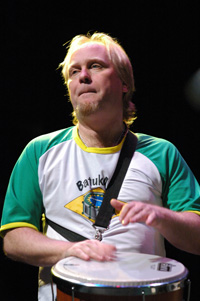"I teach a lot of labs, and it's all banging on things. We have fun. We only have about 20 students who specialize in hand percussion, so you know each and every one, and they know you. It's a much closer relationship, I think, than many departments. It's very personal."
"I deal with a lot of nonpercussionists, too—piano players, singers, horn players. I enjoy that almost more than teaching drummers. They don't have any preconceptions. One of the things that I show people who are not drummers is that just because you're playing this pattern on a hand drum, that doesn't mean that you can't apply the phrasing to your guitar comping or whatever. I'm trying to get them to think outside of the box. Many times they get caught up with the idea that it has to be done here, in this context. But that's not necessarily the case."
"We have more to offer than most schools, more variety. I think the fact that we're offering Brazilian styles, Cuban styles, Indian styles, and African styles makes it a great place to go. I wish all this had existed when I was a kid. I would have just sucked it all in."
"I think we're all quite active, performing not just locally, but worldwide. I usually have a smaller tour, a couple of weeks every year, which goes international. And I just drum, lately more with orchestras. I'm involved with a project that has become very popular in the classical world, which is The Passion of the Christ set to Latin American rhythms. We've been all over the place with that. For this particular project I've been using quite a few students, which is great for them—how often do you get to go to Australia? Of course I have to select them very carefully. It's a different world than playing jazz clubs. But I'll play anything that's fun."

